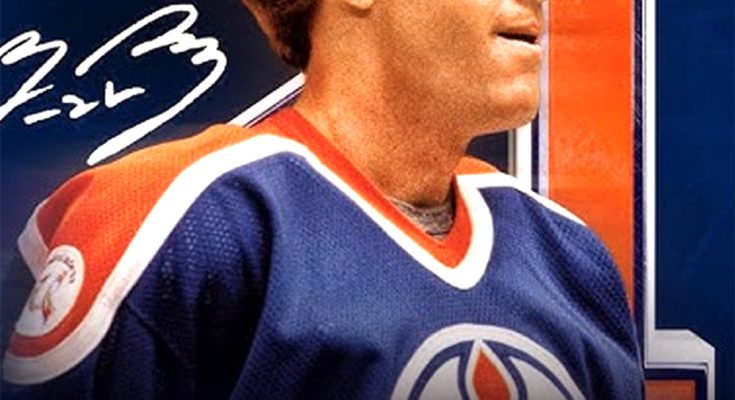Randy Gregg: From Medical Student to Five-Time Stanley Cup Champion—The Unlikely Hero Who Balanced Hockey and Healing
Randy Gregg wasn’t supposed to be a Stanley Cup champion — let alone a five-time one. In fact, he wasn’t even supposed to be in the NHL. His path was meant to lead him into a hospital, wearing a white coat instead of hockey pads, diagnosing injuries rather than risking them on the ice. But life, and hockey, had other plans, and Gregg’s story became one of the most unique and inspiring in the history of the sport.
A native of Edmonton, Gregg’s early life was shaped more by academics than athletics. While many young players chased hockey dreams in minor leagues or junior circuits, Gregg was busy studying medicine at the University of Alberta. His brilliance as a student was well-known before he ever became a household name on the ice. Even before stepping into the NHL, he was already showing leadership on an international stage — captaining Team Canada at the 1980 Winter Olympics. This was a player whose future seemed destined for hospitals and clinics, not hockey arenas filled with roaring crowds.
When Gregg finally donned the blue and orange jersey of the Edmonton Oilers in the early 1980s, he entered a locker room brimming with some of the greatest talents hockey has ever seen. Names like Wayne Gretzky, Mark Messier, Paul Coffey, and Jari Kurri were regulars, players who dazzled with speed, skill, and scoring prowess. Yet, despite being surrounded by such star power, Gregg never looked out of place. Instead, he brought something that no highlight reel could capture — calmness, maturity, and a rare perspective that balanced out the youthful fire of his teammates.
Gregg wasn’t the fastest skater or the flashiest defenseman on the ice. He didn’t score the spectacular goals or make the highlight-saving plays that capture fan attention. But what he did excel at was the subtle, often overlooked aspects of the game. His style was about doing the little things right: maintaining strong positioning, executing clean zone exits, making smart decisions under pressure. He wasn’t going to rush the puck end to end, but he’d be there to break up an opponent’s rush, kill crucial penalties, or block a shot when the stakes were highest. When tempers flared during intense playoff battles, Gregg — the future doctor — often became the calming influence and reliable veteran presence the team needed.
What truly made Gregg extraordinary was his remarkable ability to balance two worlds that rarely overlap: elite professional sports and a demanding academic career in medicine. While most players devote every waking hour to training and playing, Gregg kept medicine close to his heart even during his NHL years. He wasn’t just a player; he was a scholar-athlete who maintained a commitment to his education and future as a physician. After retiring from hockey, Gregg fulfilled his promise, becoming a practicing doctor. It’s a rare achievement — few NHL players can claim they have performed open-heart surgery after winning multiple Stanley Cups.
Within the Edmonton Oilers’ legendary dynasty, Randy Gregg was much more than a depth defenseman. He was a stabilizer, a thinker, and a consummate professional who quietly embodied what it meant to do your job exceptionally well without seeking the spotlight. He played in every one of Edmonton’s five Stanley Cup victories during the 1980s and was trusted by coaches like Glen Sather to handle tough matchups against the opposition’s top lines. His contributions often flew under the radar, but they were critical to the team’s success.
In the fast-paced, high-scoring, and often glamorous world of the 1980s Oilers, Gregg was something different — grounded, precise, and principled. He didn’t chase fame or personal accolades. Instead, he pursued excellence in his role, played the game the right way, and carried himself with humility and dedication. Off the ice, he was already preparing for a second life dedicated to healing others. The story of Randy Gregg is a powerful reminder that greatness in hockey — or any field — doesn’t always come in flashy packages. Sometimes, it’s about intelligence, heart, and the quiet confidence of knowing your purpose both on and off the ice.
His journey serves as an inspiration to athletes and non-athletes alike. Gregg’s ability to thrive in two demanding careers, balancing the physical rigors of professional hockey with the intellectual challenges of medical school, challenges the notion that elite sports and academic excellence are mutually exclusive. He showed that with determination, discipline, and passion, it’s possible to excel in both arenas.
As a member of one of hockey’s most storied teams, Randy Gregg may not have been the one scoring the game-winning goals or collecting the game’s biggest spotlight, but his impact was just as significant. He was the steady hand that helped keep a championship team together, a bridge between youthful exuberance and professional wisdom. And after his final shift on the ice, he put on a different kind of uniform — one that symbolized hope, healing, and service.
Randy Gregg’s story will forever stand out in NHL history as a testament to the power of balancing dreams, embracing dual identities, and succeeding at the highest levels in both sport and medicine. He wasn’t supposed to be a Stanley Cup champion, but by following his passions and working hard, he became one of the most remarkable champions the game has ever known.



